Select Language
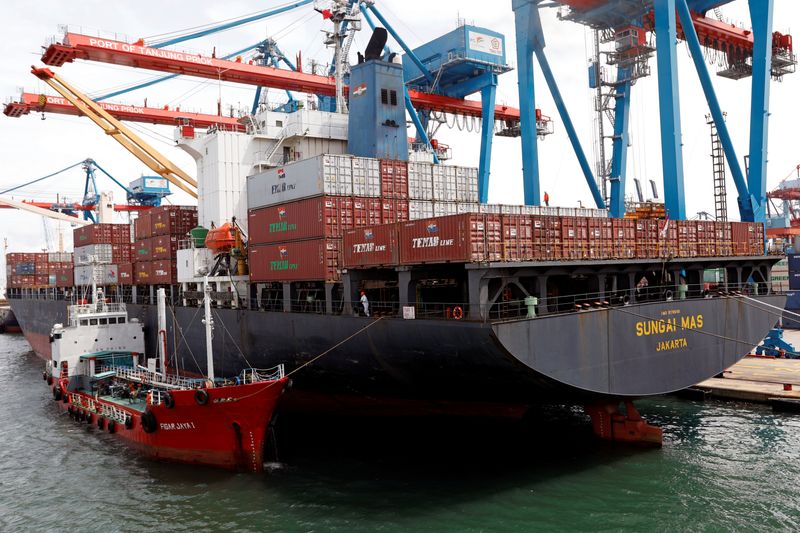
JAKARTA (Reuters) - Indonesia booked a $3.45 billion merchandise trade surplus in January, bigger than expected, amid surprisingly weak imports, official data showed on Monday.
A Reuters poll of analysts had expected a surplus of $1.91 billion for January.
Imports last month were worth $18 billion, down 2.67% from the same month a year earlier, in contrast with analysts' forecast of a 9.95% growth.
Exports rose 4.68% on an annual basis in January to $21.45 billion, compared with 6.99% growth expected in the poll.
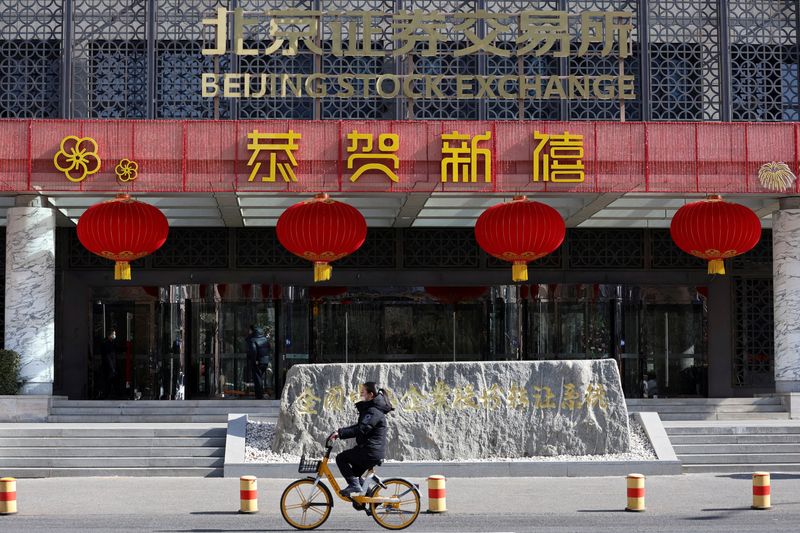
By Wayne Cole
SYDNEY (Reuters) - Asia share markets crept higher on Monday as Hong Kong's tech sector stole the limelight, while upbeat Japanese economic growth contrasted with a weak U.S. retail sales report to lift the yen on the dollar.
Geopolitics remained in focus with reports that talks on the Russian-Ukraine conflict will begin in Saudi Arabia this week, though the participants are not entirely clear.
The imminent threat of reciprocal U.S. tariffs has receded until April, but the risk that they might include levies based on value added taxes in other countries was a major worry.
"The prospect, however misguided, of the U.S. levying an additional 20% tariff on all EU imports, on top of whatever else it deems appropriate, and to varying degrees on all other countries who have VAT regimes is a truly terrifying prospect in terms of the implications for global growth," said Ray Attrill, head of FX research at National Australia Bank (OTC:NABZY).
The Financial Times reported on Sunday that the European Commission would explore tough import limits on certain foods made to different standards in an effort to protect its farmers, echoing President Donald Trump's reciprocal trade policy.
For now, investors were just relieved that major tariffs had not already been introduced and MSCI's broadest index of Asia-Pacific shares outside Japan firmed 0.3%.
Tokyo's Nikkei edged up 0.2% after Japan reported surprisingly strong economic growth of an annualised 2.8% for the fourth quarter. The gains were limited by a further rise in the yen to 151.65 per dollar.
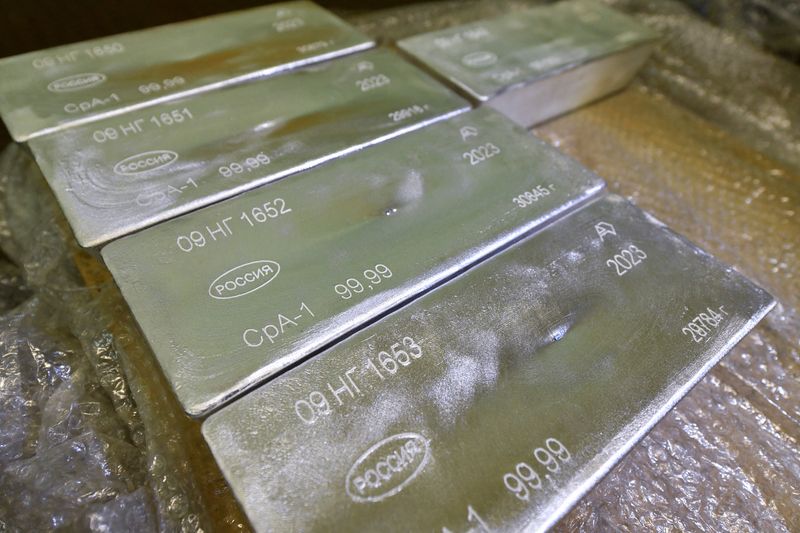
By Brijesh Patel and Daksh Grover
(Reuters) -Silver prices hit their highest since late October on Friday, latching on to factors that drove gold to successive record highs, with some analysts suggesting investors in the metal may aim to challenge a 10-year high just shy of $35 per ounce.
However some analysts were cautious on the market's trajectory, given higher volatility in silver and a failure to reach similar dizzying heights as gold in 2024.
Spot silver was last up 2% at $33 per ounce, having hit its highest level since late October at $33.41. The white metal scaled a more than 10-year peak of $34.87 per ounce on October 22. [GOL/]
"Silver's been a laggard, and some would refer to it as the Cinderella metal, because it always misses the ball. Having said that, silver has finally woken up and broken above some key technical resistance," independent analyst Ross Norman said.
If current momentum continued, silver could challenge the $35 level, he added.
After rising 21% in 2024, silver, both a precious and industrial metal, has gained 14% so far in 2025 supported by similar factors to gold - a jump in U.S. Comex futures prices on concerns of a possible trade war sparked by proposed U.S. import tariffs. The U.S. March silver contract was last up 3.3% at $33.79.
In recent weeks the spread between Comex gold futures and London spot prices has widened significantly, while the spot gold price hit a record $2,942.70 per ounce on Tuesday. [GOL/]
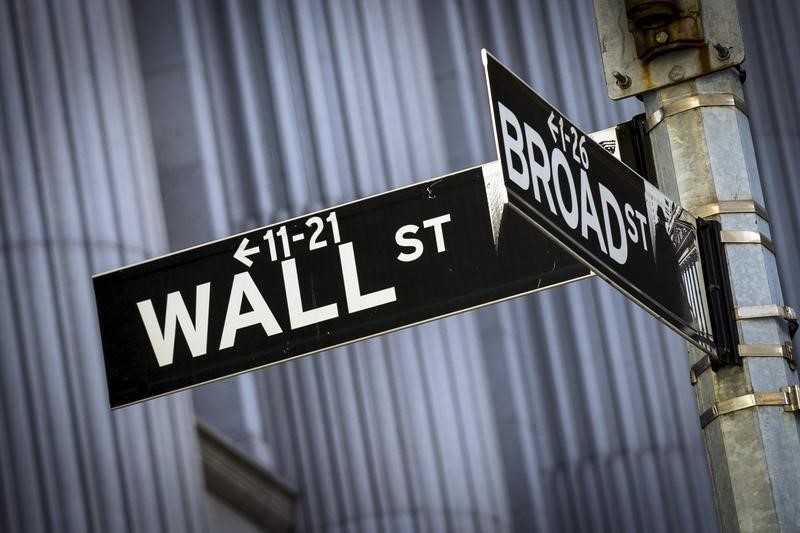
Investing.com-- U.S. stock index futures moved little in holiday-thinned trade on Sunday evening, amid persistent caution over U.S. President Donald Trump’s plans for trade tariffs and signs of sticky inflation.
Futures steadied after a mixed session on Wall Street on Friday, where the S&P 500 ended just below record highs amid sustained gains in technology stocks. But most other sectors lagged.
Focus this week is now on a slew of Federal Reserve speakers, as well as the minutes of the central bank’s January meeting, where it kept interest rates steady. Strong inflation readings from last week kept investors anticipating no near-term cuts in interest rates.
S&P 500 Futures rose slightly to 6,135.50 points, while Nasdaq 100 Futures rose 0.1% to 22,212.50 points by 19:25 ET (00:25 GMT). Dow Jones Futures steadied at 44, 646.0 points.
Trading volumes were muted, with U.S. markets set to remain closed for a holiday on Monday.
Trump tariff caution persists
Investors remained on edge over more tariff action under Trump, who last week imposed 25% tariffs on all imports of steel and aluminum.
Trump also signed an executive order outlining plans for reciprocal tariffs against U.S. trading partners, which could ramp up a global trade war. Trump had earlier this month also imposed 10% tariffs against China.
Still, Trump said that his reciprocal tariffs will only be imposed by April, offering markets some relief.
The S&P 500 ended flat at 6,114.63 points on Friday, while the NASDAQ Composite rose 0.4% to 20,026.77 points. The Dow Jones Industrial Average fell 0.4% to 44,546.08 points.
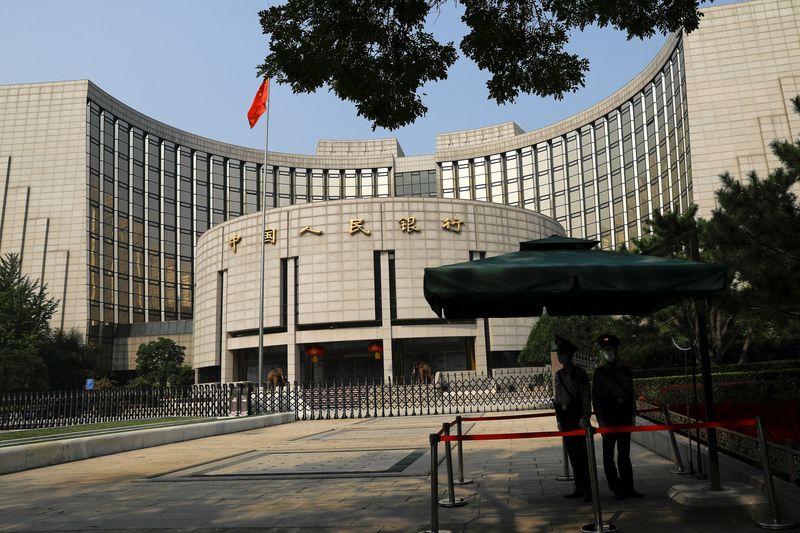
By Ethan Wang and Kevin Yao
BEIJING (Reuters) -New bank loans in China surged more than expected to a record high in January as the central bank moved to shore up a patchy economic recovery, reinforcing expectations for more stimulus in coming months as U.S. tariffs threaten to pile more pressure on the economy.
Chinese banks extended 5.13 trillion yuan ($706.40 billion) in new yuan loans in January, more than quadrupling the December figure, data from the People's Bank of China showed on Friday, beating analysts' forecasts
Analysts polled by Reuters had predicted new yuan loans would rise to 4.5 trillion yuan last month, up sharply from 990 billion yuan in December and compared with 4.92 trillion yuan a year earlier - the previous record.
Chinese banks usually rush to lend at the beginning of the year as they compete for higher-quality customers and win market share, but analysts cautioned that lingering economic uncertainty continues to weigh on credit demand.
"While the headline figures for new local currency loans hit a record high in January, that's only due to the usual season pattern. Net lending is always the strongest in the start of the year," Capital Economics said in a note.
"Bank loan growth continued to slide to record lows, but this was offset by a pick-up in non-bank credit growth. Robust government bond issuance should continue supporting credit growth in the coming quarters, but weak private demand will likely keep credit growth subdued."
Household loans, including mortgages, rose to 443.8 billion yuan in January from 350 billion yuan in December, while corporate loans jumped to 4.78 trillion yuan from 490 billion yuan, central bank data showed.
New bank lending totalled 18.09 trillion yuan last year, down from a record 22.75 trillion yuan in 2023 and hitting the lowest level since 2019, as businesses and consumers remained cautious about taking on more debt amid an uncertain economic outlook.
The economy grew 5% in 2024, meeting the government's official target, but the post-pandemic recovery has been patchy, with exports and manufacturing making up for weak domestic consumption.
Beijing is expected to maintain a growth target of around 5% this year, but analysts are uncertain over how quickly policymakers can revive sluggish domestic demand, even as U.S. President Donald Trump's punitive trade measures put more pressure on Chinese exporters.
To sustain growth and counter rising external pressures, Beijing has pledged higher fiscal spending, increased debt issuance and further monetary easing.
The central bank said on Thursday it would adjust its monetary policy at the appropriate time and use policy tools such as interest rates and bank reserve requirement ratios (RRR) to support the economy, amid rising external headwinds.
China is facing a renewed trade war with the United States after President Donald Trump slapped sweeping 10% tariffs on all Chinese imports.
In response, Beijing announced tariffs up to 15% on some U.S. imports starting February 10.
Still, the measures so far have been more modest than markets had feared, raising hopes there was room for negotiating.
Since September, Beijing has stepped up efforts to get the economy back on track, including interest rate cuts, a 10 trillion yuan debt relief package for local government, and tax incentives to spur demand in the crisis-hit property market.
FURTHER POLICY EASING EXPECTED
While the central bank has been firmly supporting the yuan currency in the face of Trump's threats, analysts expect it will deliver further cuts in interest rates and RRR as early as the first quarter.
Investors are looking to the annual parliament meeting in March, when the government is expected to unveil fresh stimulus measures, alongside economic targets.
Reflecting credit demand concerns, outstanding yuan loans rose 7.5% in January from a year earlier - the lowest on record - down from 7.6% pace in December. Analysts had expected 7.3% growth.
Broad M2 money supply grew 7.0% from a year earlier, the central bank data showed, below analysts' 7.2% forecast in a Reuters poll. In December, M2 expanded 7.3%.
The narrower M1 money supply climbed 0.4% in January from a year earlier, compared with a 1.4% fall in December.
Starting from January, the central bank included personal demand deposits and non-bank payment institutions' client provisions in M1, which previously covered only cash in circulation and corporate demand deposits.
Annual growth of outstanding total social financing (TSF), a broad measure of credit and liquidity in the economy, came in at 8.0% in January, unchanged from December.
Acceleration in government bond issuance to boost the economy could help boost growth in TSF.
TSF includes off-balance sheet forms of financing that exist outside the conventional bank lending system, such as initial public offerings, loans from trust companies, and bond sales.
TSF surged to 7.06 trillion yuan in January from 2.86 trillion yuan in December . Analysts polled by Reuters had expected 6.4 trillion yuan.
($1 = 7.2622 Chinese yuan renminbi)
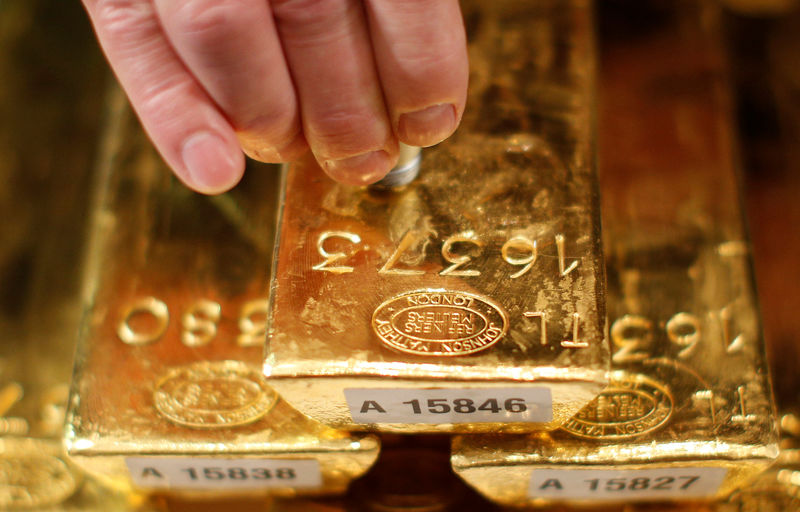
Investing.com-- Gold prices moved little in Asian trade on Friday, remaining close to record highs even as U.S. President Donald Trump postponed plans for reciprocal tariffs, sparking a risk-on move in financial markets.
But steep losses in the dollar aided gold, as the greenback gave up a bulk of its recent gains on Trump’s move. The dollar was also dented by some mixed inflation data, which drove up optimism over lower interest rates this year.
Weakness in the dollar also helped gold move past diminished safe haven demand, as Trump flagged potential peace talks over Russia and Ukraine.
Spot gold steadied at $2,928.91 an ounce, while gold futures expiring in April rose 0.4% to $2,957.19 an ounce by 00:22 ET (05:22 GMT). Spot gold remained close to a record high of $2,943.25/oz hit earlier this week.
Gold heads for seventh positive week as haven demand persists
Gold prices were set to add about 2.4% this week- their seventh consecutive week of gains, as demand for safe havens remained in play amid uncertainty over Trump’s policies.
Trump on Thursday signed an executive order exploring potential reciprocal tariffs on major U.S. trading partners, which will be imposed by April, as compared to earlier threats that they would come this week.
Market sentiment improved on this notion, given that the April deadline gives countries more time to negotiate with Washington.
But Trump still kept up his harsh trade rhetoric, having imposed 25% duties on steel and aluminum imports earlier this week.
Uncertainty over Trump kept safe haven bids for gold squarely in play, even as near-term risk sentiment appeared to have improved.
Copper, industrial metals benefit from tariff speculation
Industrial metals surged this week, as Trump’s tariffs on the sector spurred bets that U.S. companies will struggle to source domestic supplies. While copper was not subject to any tariffs, traders were seen betting that the red metal will also eventually face duties.
Additionally, China also imposed export controls on several key materials as retaliation for Trump’s tariffs, drumming up hopes of a supply shortfall.
Benchmark copper futures on the London Metal Exchange rose 0.9% to $9,572.05 a ton, while March copper futures rose 0.4% to $4.8045 a pound.
Softer dollar benefits metal markets amid mixed inflation
The dollar fell sharply over the past two sessions, giving up most of its recent gains made on Trump’s tariffs.
But the dollar was also pressured by somewhat mixed inflation data, which spurred bets on eventual interest rate cuts by the Federal Reserve.
While both producer and consumer inflation readings read higher than expected for January, certain components of the two which factor into PCE price index inflation, softened slightly.
PCE data is the Fed’s preferred inflation gauge, and a downtrend in the reading could give the central bank more headroom to cut rates.
Other precious metal prices rose on this notion. Platinum futures rose 0.2% to $1,050.45 an ounce, while silver rallied nearly 2% to $33.352 an ounce.
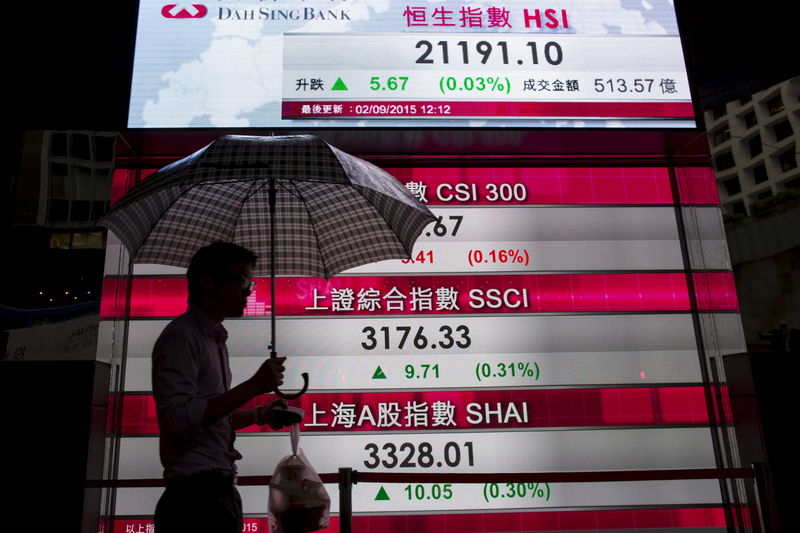
(Reuters) - Japanese investors withdrew heavily from foreign stocks in the week through February 8, snapping an eight-week buying spree as U.S. President Donald Trump's widening tariffs threat sparked fears of global trade relationships reshaping in the U.S.' favour.
Japanese investors divested 1.27 trillion yen ($8.31 billion) worth of foreign equities on a net basis, the most for a week since November 2022, according to Japan's Ministry of Finance data.
Trump has previously announced steep tariffs on Mexico, Canada, and China -- although he has delayed implementing some of those -- and towards the end of last week, widened his focus by threatening to slap reciprocal tariffs on countries that tax the import of U.S. products.
In response, Japanese investors sought the relative safety of bonds, pumping in a robust 1.75 trillion yen into foreign long-term bonds, the largest amount in any week since September 2024. They also snapped up a net 18 billion yen worth of short-term bills.
At the same time, Japanese shares suffered a net 384.4 billion yen worth of foreign outflows, the second week of net sales in a row.
Foreigners also ditched 187.2 billion yen worth of long-term Japanese bonds, snapping a three-week-long buying trend. They, however, purchased short-term bills of a net 508.1 billion yen, registering a fifth weekly net purchase in six weeks.
($1 = 152.7900 yen)
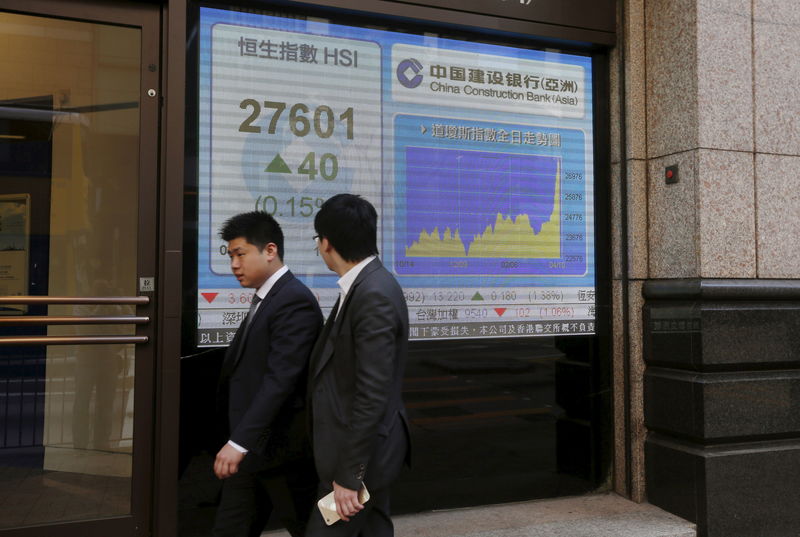
Most Asian stocks moved in a flat-to-low range on Friday amid growing concerns over increased U.S. trade tariffs and sticky inflation, while an artificial intelligence-fueled rally in Chinese stocks powered on.
Regional markets took limited cues from a strong overnight close on Wall Street, as investors were relieved by U.S. President Donald Trump not immediately imposing reciprocal tariffs, as he had earlier threatened.
But U.S. stock index futures were flat in Asian trade, given that Trump still signed an order outlining plans to impose higher duties on major U.S. trading partners. Hotter-than-expected producer inflation data also added to angst over higher for longer interest rates, following a strong consumer inflation reading earlier this week.
Chinese shares- particularly major tech stocks in Hong Kong- remained key outperformers in Asia, especially after the release of the DeepSeek AI in late-January.
Australian markets also hit record highs, as investors positioned for an interest rate cut by the Reserve Bank of Australia next week.
Other Asian markets were less upbeat. Japan’s Nikkei 225 and TOPIX indexes fell 0.5% and 0.1%, respectively, as local exporters were pressured by a sharp overnight recovery in the yen.
Singapore’s Straits Times index fell 0.4%, even as the country’s fourth-quarter gross domestic product grew much more than expected.
South Korea’s KOSPI added 0.4% on persistent gains in tech stocks, while futures for India’s Nifty 50 index pointed to a flat open, as investors digested mixed signals from a meeting between Trump and Prime Minister Narendra Modi.
While Modi and Trump flagged plans for greater trade, defense and policy cooperation between Washington and Beijing, Trump still chided India’s steep duties on U.S. imports- which could attract greater reciprocal tariffs.
Hong Kong stocks up as DeepSeek rally powers on
China’s Shanghai Shenzhen CSI 300 and Shanghai Composite indexes moved in a flat-to-low range. But Hong Kong’s Hang Seng index soared 1.6% and remained close to a four-month high.
Gains were fueled chiefly by sustained buying into heavyweight tech stocks, as the release of DeepSeek R1 in late-January fueled renewed optimism in China’s AI capabilities.
Morgan Stanley (NYSE:MS) analysts said that DeepSeek had helped shore up sentiment towards Chinese markets, especially the blue-chip A shares. But they warned that lingering weakness in other aspects of the country, especially a rampant disinflationary trend, had caused a divergence between tech and non-tech sectors.
Australia shares hit record high on RBA rate cut bets
Australia’s ASX 200 rose 0.5% to a record high of 8,615.20 points, on gains across most heavyweight sectors.
Local stocks were boosted by growing confidence that the RBA will cut interest rates by 25 basis points at a meeting next week, and kick off a shallow easing cycle on concerns over a slowing Australian economy.
Some soft inflation data in recent weeks also fueled bets on an RBA cut, although inflation remained well above the central bank’s 2% to 3% target range.
Australian stocks were also boosted by gains in major mining stocks, as traders bet that tropical cyclone Zelia- which is set to hit key mining regions in the country- will disrupt supplies, pushing up commodity prices.

By Rahul Trivedi
BENGALURU (Reuters) - Thailand's economy likely grew at its fastest pace in over two years last quarter, driven by a surge in foreign tourists and strong exports that helped offset sluggish domestic demand, a Reuters poll of economists found.
While household consumption is expected to remain under pressure despite the government's cash handout to stimulate demand, exports and a steady flow of tourists during the holiday season probably helped growth.
Southeast Asia's second-largest economy was forecast to expand 3.9% in the October-December period, compared with the same period the previous year, according to the median prediction in a February 6-12 Reuters poll of 15 economists, up from 3.0% in the previous quarter.
Forecasts for the data, due on February 17, ranged between 3.1% to 4.6%.
"The good news is the recovery we saw in Thai exports last year continued (into) Q4, both on the goods and services side. Services mostly reflect the recovery in the tourism sector," said Miguel Chanco, chief emerging Asia economist at Pantheon Macroeconomics.
"Q4, in a one-liner, would be stalling domestic demand, which is going to be offset to some extent by the continued strength in exports," Chanco added.
But on a quarterly basis, gross domestic product (GDP) likely grew a seasonally adjusted 0.7%, down from 1.2% the previous quarter, according to a smaller sample of forecasts.
Several economists in the poll said the service sector continued to accelerate, driven by a revival in tourism, while manufacturing continued to struggle.
Eugene Tan, an associate economist at Moody's (NYSE:MCO), attributed the slowdown in manufacturing to declining demand in the auto industry.
"On the expenditure front, private consumption, the heavyweight of GDP, has faltered, signaling broader economic weakness," Tan said.
While the government expects Thailand's economy to grow 3.0%in 2024, up from 1.9% in 2023, central bank Governor Sethaput Suthiwartnarueput cautioned that weak consumption could hold back growth.
In an interview with Reuters, he suggested actual growth might be closer to 2.7%, aligning with the Reuters poll median.
An economic slowdown in China - Thailand's largest trading partner and a key source of tourism revenue - along with weak global demand and the escalating U.S.-China trade war could further pressure the country's trade prospects and weigh on its growth outlook this year.
A separate Reuters poll projected Thailand's economic growth to average 2.9% in 2025. Deputy finance minister, Julapun Amornvivat, estimated the economy to grow 3.5%.

By Karen Braun
NAPERVILLE, Illinois (Reuters) - Relative to demand, world corn stocks later this year are predicted to hit 11-year lows.
But when considering corn supplies actually accessible to the global market, the milestone is closer to three decades.
On-and-off grain importer China has an extraordinary amount of corn in storage, more than five times that of the United States, the No. 2 corn stockpiler. As such, China is sometimes excluded from world grain balances to obtain a more realistic view of available supplies.
After subtracting China, estimates from the U.S. Department of Agriculture show 2024-25 world corn ending stocks at a 12-year low of about 87 million metric tons.
Supplies are even tighter when measured against demand. In 2024-25, world corn stocks-to-use sans China is pegged at 7.8%, the lowest ratio since 1995-96. That compares with a four-year average of 9.2% and a 20-year average of 11%.
Corn supplies in No. 2 exporter Brazil are predicted at the lowest levels in more than two decades, and Ukrainian and European Union stocks are the thinnest in over a decade. U.S. inventory is now seen as modest versus prior expectations for ample volumes.
Things are still somewhat snug even when adding back China. USDA’s figures imply full world corn stocks-to-use in 2024-25 at 20.3%, the lowest since 2013-14. That compares with a decade average of 24.6% and a low within that period of 22.2%.
Stocks-to-use throughout most of the 2000s and early 2010s was notably lower, usually below 15%. That might make the current situation appear a bit less extreme, but a glance at Chinese stocks perhaps explains the difference.
CHINA CONUNDRUM
In the mid-2000s, China accounted for around 30% of global corn ending stocks, though that surged in the early 2010s as the country incentivized increasing production.
China’s share of global corn stocks has been above 60% over the last decade, and according to USDA will reach a 28-year high of 70% in 2024-25.
In 2008, Beijing began a government corn stockpiling program, paying farmers above-market rates for their crops. This ended in 2016 amid sky-high costs for the government, which was keeping domestic prices well above global ones, unintentionally encouraging imports.
China has continued to subsidize corn farmers and output has grown even further, hence the large stockpiles.
Excluding China from global grain analyses might be controversial because the original premise lies in the country’s minimal involvement in global trade. Although it has backed off significantly this year, China has been the world’s No. 1 corn importer within the last five years.
However, China’s corn imports in the last few years have accounted for about 7% of its annual corn consumption, extremely light versus other top importers. Nearly 100% of Japan and South Korea’s corn use comes from imports, and Mexico’s rate has climbed above 50%.
This statistic plus China’s enormous share of world stocks defends the exclusion of China from global corn balance sheets, but its sometimes-importer status means that both calculations are worthwhile.
U.S. STOCKPILES
Corn stocks in the United States, the leading exporter, will be thinner than originally assumed. But the situation is not as rare as the global one.
USDA figures peg 2024-25 U.S. corn stocks-to-use at 10.2%, below the year-ago 11.8% and the decade average of 12.5% but slightly above the levels of the early 2020s.
In mid-2024, the 2024-25 ratio was forecast above 14%, but strong demand plus a smaller crop pared inventory. This helped propel large speculators into their currently massive bullish bets on Chicago corn futures.
However, corn bulls know that U.S. farmers are ready and willing to boost supplies by planting a potentially huge area this spring.
Although an inherently bearish force, plentiful corn supplies are what allow the United States to dominate the global export market and provide for customers like China, should it ever resume the interest.
Karen Braun is a market analyst for Reuters. Views expressed above are her own.

